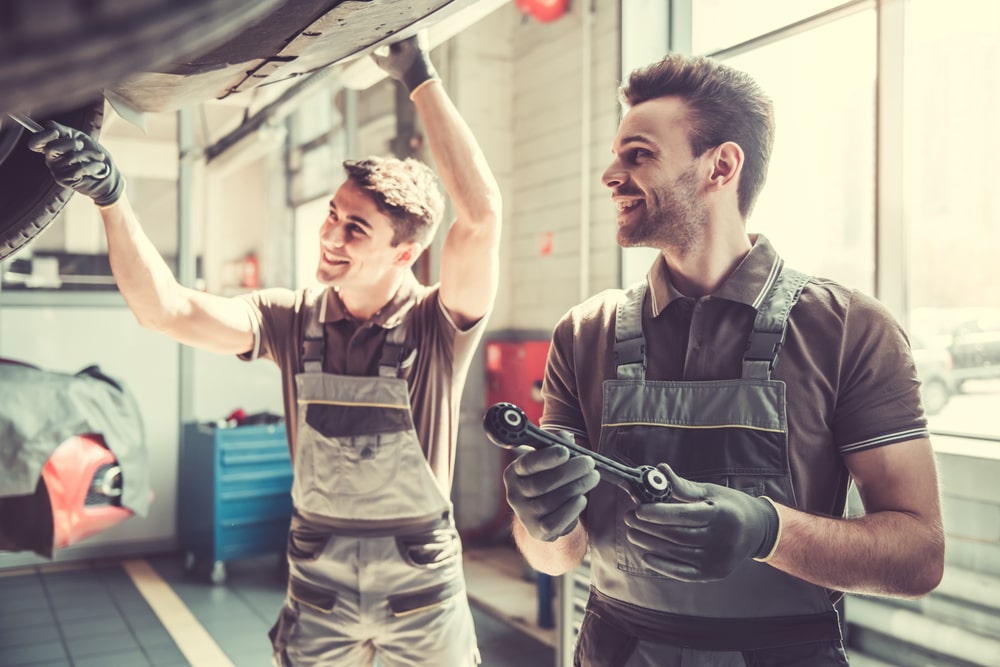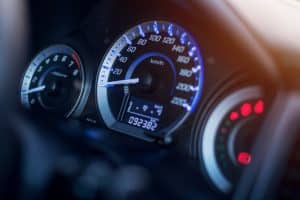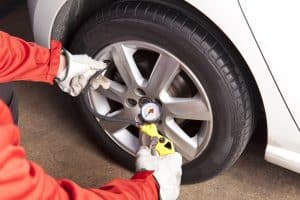
- The Savvy Promise
At Savvy, our mission is to empower you to make informed financial choices. While we maintain stringent editorial standards, this article may include mentions of products offered by our partners. Here’s how we generate income.
In this article
Whether you're a seasoned driver or a new car owner, staying on top of your vehicle's servicing, maintenance, and repairs is crucial for its safety, longevity, and performance. It’s especially important in Australia at the moment, where the repair and maintenance industry has shrunk and experienced greater volatility following the COVID-19 pandemic, according to an August 2023 study by IBISWorld.
That’s where Savvy can help. We’ve pieced together a comprehensive checklist to help you navigate the car maintenance journey with ease. Dive into the essential steps to take, recommended service intervals and valuable tips to keep your car running smoothly and safely with us today!
How to service a car: the checklist
When it comes to servicing your car, it’s important to be aware of all its moving parts and ongoing maintenance needs. The general list of things you’ll need to keep an eye on is as follows:
- Vehicle fluids (such as engine oil, brake fluid and coolant)
- Batteries (ensuring they don’t get too old and watching for signs of decline)
- Air filters (avoiding clogging to help your engine achieve peak performance)
- Tyres (ensuring they’re in good condition and have the correct pressure and alignment)
- Windscreen wipers (ensuring the rubber is fresh, not dried out, and fluids remain topped up)
- Exterior lights (ensuring your front and rear lights are still fully operational)
- Handbrake and/or gear stick (these must be fully functional)
- Glass (making sure windscreens and windows are without cracks that could eventually smash)
- General safety (such as seatbelts and airbags)
- General functions (such as looking out for warning lights or strange sounds)
Vehicle fluids
Your car relies on a variety of fluids to function properly and efficiently. These fluids play critical roles in lubricating moving parts, regulating temperature and transferring power throughout the system. Regularly checking and maintaining these fluids is essential for preventing breakdowns, extending the lifespan of your car and helping ensure optimal performance. Fluids will be checked in all basic car services.
Some of the important fluids to keep an eye on include:
- Engine oil: engine oil reduces friction between moving parts, helping to minimise wear and tear. Regular oil changes every 5,000km to 10,000km and using the correct oil type as recommended by your car's manufacturer are crucial for maintaining engine health.
- Coolant: this plays a vital role in regulating engine temperature. It absorbs heat from the engine and transfers it to the radiator, where it's released into the air. Maintaining the proper coolant level and ensuring it's not past its recommended replacement interval is essential for engine protection.
- Brake fluid: this fluid plays a critical role in your car's braking system. It transmits the force you apply to the brake pedal to the wheels, allowing them to slow down and stop the car. You should regularly check and replace brake fluid according to your manufacturer's recommendations.
- Differential fluid: this lubricant reduces friction and wear in the differential, a component that transmits power from the engine to the wheels. Maintaining the proper level and type of differential fluid is essential for smooth and efficient power delivery, especially for vehicles that frequently tow or go off-road.
- Power steering fluid: this fluid is used in power steering systems to make steering the car easier, especially at low speeds and when parking. Low power steering fluid can make steering feel stiff and difficult, and neglecting it can lead to damage to the power steering system.
- Gearbox oil (manual transmissions only): manual cars use gearbox oil to lubricate gears and other moving parts. This oil reduces friction, minimises wear and tear and allows for smooth gear changes.
Car battery
The car battery is often referred to as the heart of your car's electrical system. It plays a critical role in starting the engine and supplying power to various electronic components, from the lights and entertainment system to the engine control unit and safety features. A healthy battery ensures your car starts reliably and operates all its electrical functions without fanfare.
Regularly checking and maintaining your car battery is essential for preventing unexpected breakdowns and ensuring a smooth driving experience. While it’s often good to leave these things to the experts, it’s worth knowing how to change a car battery if you ever find yourself in a pinch.
Here's why the car battery deserves your attention:
- Deterioration over time: car batteries don't last forever. Extreme weather conditions, short trips and leaving electrical components like interior lights on accidentally can all contribute to a battery's decline. Regularly checking the battery's health and voltage can help you identify potential issues before they leave you stranded.
- Signs of a failing battery: if your car struggles to crank or takes longer than usual to start, it might be a sign of a weakening battery. Dim headlights, flickering interior lights or malfunctions in electronic components can also be indicators of a failing battery. Addressing these issues promptly can prevent a complete battery failure and the inconvenience of being stranded.
Air filters
Your car's engine relies on clean air for optimal performance and longevity, which is made possible by the engine air filter. Regularly checking and replacing this filter is essential for maintaining engine health fuel efficiency, and overall performance.
The air filter acts as a shield, preventing harmful contaminants like dust, dirt and pollen from entering the engine. These contaminants can cause significant issues if left unchecked:
- Internal wear and tear: abrasive particles like dust can cause wear and tear on essential engine components. This can lead to reduced engine performance, increased oil consumption and even potential engine failure.
- Reduced engine efficiency: a clogged air filter restricts the flow of clean air entering the engine. This disrupts the air-fuel mixture, potentially leading to incomplete combustion and reduced engine efficiency. This translates to decreased power output and poorer fuel economy.
By replacing the engine air filter at the recommended intervals, as outlined in your car's manual, you can help ensure clean air reaches the engine to enable smoother operation, higher air quality inside your vehicle and better fuel efficiency.
Tyres
Your car's tyres ensure safe and controlled driving, influencing everything from handling and braking to fuel efficiency and overall performance. Regularly checking and maintaining your tyres is paramount for your safety and a smooth driving experience (this is another area which is often checked in basic car services).
Tyres are susceptible to wear and tear over time and their condition significantly impacts your car's behaviour on the road. Key factors to consider include:
- Tyre pressure: underinflated tyres are a major contributor to wasted fuel. They create increased rolling resistance, forcing the engine to work harder to overcome this resistance and maintain speed. This translates to reduced fuel efficiency and potentially sluggish acceleration.
- Reduced grip: worn or damaged tyres can compromise your car's grip on the road, especially in wet or challenging weather conditions. This can lead to increased stopping distances, hydroplaning on wet surfaces and loss of control during cornering. Regularly checking your tyre tread depth is essential.
Windscreen wipers
While windscreen wipers might seem like a simple component, they play a vital role in ensuring safe driving during challenging weather. They’re essential for maintaining good visibility, a critical factor for safe driving in rain, hail or shine. Here’s why it’s important to keep them in good condition:
- Reduced visibility and compromised safety: worn or damaged wiper blades can streak, chatter or leave uncleaned areas on the windscreen. This significantly reduces visibility, especially during heavy rain. In such conditions, impaired visibility can lead to dangerous situations and potentially accidents.
- Lack of wiper fluid: over time, wiper fluid can become dirty, lose its cleaning effectiveness or run dry. Regularly checking and replacing the wiper fluid ensures it remains clean and effective at removing dirt, grime and debris from the windscreen.
Exterior lights
Your car's exterior lights play a critical role in ensuring safe driving during low-light conditions and adverse weather. They allow you to see the road clearly and alert other drivers of your presence, preventing accidents along the way. Regularly checking and maintaining your exterior lights is an essential part of car care. The lights to keep an eye on include:
- Headlights
- Reverse lights
- Brake lights
- Fog lamps
- Indicator and hazard lights
Handbrake and/or gear stick
While handbrakes and gearsticks may not be part of routine maintenance checks, they are crucial components for controlling your car and deserve your attention. However, they typically don't require regular maintenance beyond basic checks unless you experience specific issues. Here's why they're important:
- Handbrake: the handbrake is essential for safe parking, especially on hills. Signs of a faulty handbrake can include excessive effort required to engage it, the car rolling even with the brake engaged or a warning light on the dashboard.
- Gear stick: the gear stick allows you to control the gear ratios in your car. While the gears themselves are lubricated as part of routine servicing, any issues with the gear stick itself can impact your ability to control the car safely. This could result in difficulty selecting gears, grinding noises when shifting or the car unintentionally slipping out of gear.
If you experience any issues with your handbrake or gearstick, it's crucial to have them checked by a qualified mechanic to ensure safe vehicle operation.
Glass
Your car's glass, primarily the windscreen and side windows, is essential to keep in good condition. Cracks or chips left unattended can weaken the windscreen and compromise its structural integrity, potentially resulting in much larger breaks which require more extensive work. Addressing any damage to the windscreen promptly helps maintain the overall safety of your vehicle.
General safety
While general features like seatbelts and airbags aren’t routine maintenance items themselves, they’re undoubtedly the most crucial safety features in your car. Having issues with your seatbelts or not knowing about old or faulty airbags in your car could leave you and your passengers at risk, so it’s always important to ensure they’re in proper working order.
General warning signs
Above all else, you should always keep an eye out for small warnings around your car. Whether it’s lights flashing on your dashboard, unexplained beeps or funny sounds coming from under the bonnet, being proactive when it comes to potential issues and not letting them go until your car malfunctions can be beneficial for its health in the long run.
Car maintenance and servicing tips
While all of the above are worth monitoring, it’s also important to keep a few solid tips in mind when it comes to maintaining and servicing your vehicle. These include:
- Sticking to your servicing schedule: this ensures your car receives the recommended maintenance at the proper intervals, helping prevent future problems, maximising its lifespan and maintaining optimal performance and safety. If you don’t stick to your schedule, car insurance claims can be voided in some cases.
- Checking in with your car's manual: the manual provides specific recommendations for your car's make and model, including service intervals, fluid types and proper maintenance procedures.
- Taking the time to find a reliable repairer: choosing a qualified and reputable mechanic ensures your car is serviced by professionals who use quality parts and adhere to recommended procedures, giving you peace of mind and protecting your investment.
Did you find this page helpful?
Author
Thomas PerrottaReviewer
Bill TsouvalasPublished on June 15th, 2020
Last updated on March 18th, 2024
Fact checked
This guide provides general information and does not consider your individual needs, finances or objectives. We do not make any recommendation or suggestion about which product is best for you based on your specific situation and we do not compare all companies in the market, or all products offered by all companies. It’s always important to consider whether professional financial, legal or taxation advice is appropriate for you before choosing or purchasing a financial product.
The content on our website is produced by experts in the field of finance and reviewed as part of our editorial guidelines. We endeavour to keep all information across our site updated with accurate information.
Approval for car loans is always subject to our lender’s terms, conditions and qualification criteria. Lenders will undertake a credit check in line with responsible lending obligations to help determine whether you’re in a position to take on the loan you’re applying for.
The interest rate, comparison rate, fees and monthly repayments will depend on factors specific to your profile, such as your financial situation, as well others, such as the loan’s size and your chosen repayment term. Costs such as broker fees, redraw fees or early repayment fees, and cost savings such as fee waivers, aren’t included in the comparison rate but may influence the cost of the loan. Different terms, fees or other loan amounts may result in a different comparison rate.








